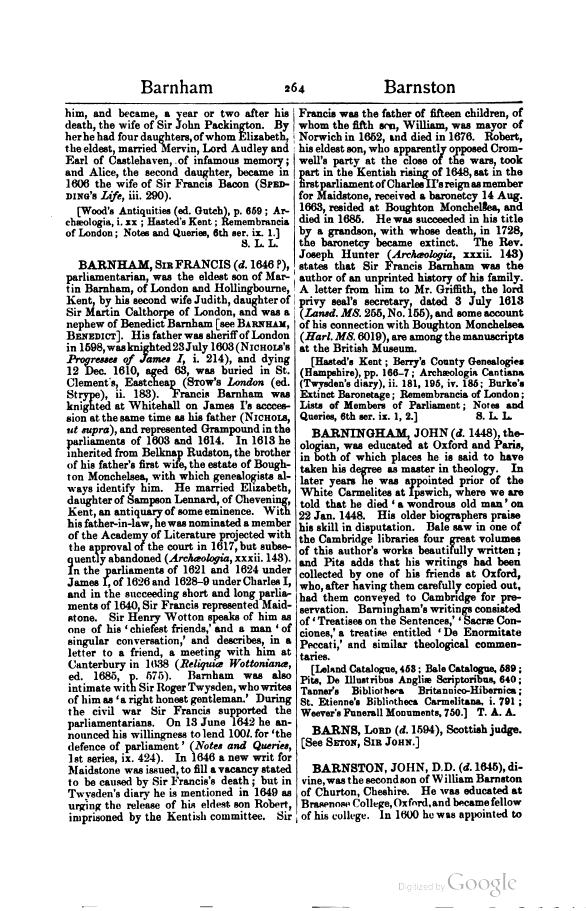him, and became, a year or two after his death, the wife of Sir John Packington. By her he had four daughters, of whom Elizabeth, the eldest, married Mervin, Lord Audley and Earl of Castlehaven, of infamous memory; and Alice, the second daughter, became in 1606 the wife of Sir Francis Bacon (Spedding's Life, iii. 290).
[Wood's Antiquities (ed. Gutch), p. 659; Archæologia, i. xx; Hasted's Kent; Remembrancia of London; Notes and Queries, 6th ser. ix. 1.]
BARNHAM, Sir FRANCIS (d. 1646?), parliamentarian, was the eldest son of Martin Barnham, of London and Hollingbourne, Kent, by his second wife Judith, daughter of Sir Martin Calthorpe of London, and was a nephew of Benedict Barnham [see Barnham, Benedict]. His father was sheriff of London in 1598, was knighted 23 July 1603 (Nichols's Progresses of James I, i. 214), and dying 12 Dec. 1610, aged 63, was buried in St. Clement's, Eastcheap (Stow's London (ed. Strype), ii. 183). Francis Barnham was knighted at Whitehall on James I's acccession at the same time as his father (Nichols's, ut supra), and represented Grampound in the parliaments of 1603 and 1614. In 1613 he inherited from Belknap Rudston, the brother of his father's first wife, the estate of Boughton Monchelsea, with which genealogists always identify him. He married Elizabeth, daughter of Sampson Lennard, of Chevening, Kent, an antiquary of some eminence. With his father-in-law, he was nominated a member of the Academy of Literature projected with the approval of the court in 1617, but subsequently abandoned (Archæologia, xxxii. 143). In the parliaments of 1621 and 1624 under James I, of 1626 and 1628–9 under Charles I, and in the succeeding short and long parliaments of 1640, Sir Francis represented Maidstone. Sir Henry Wotton speaks of him as one of his ‘chiefest friends,’ and a man ‘of singular conversation,’ and describes, in a letter to a friend, a meeting with him at Canterbury in 1638 (Reliquiæ Wottonianæ, ed. 1685, p. 575). Barnham was also intimate with Sir Roger Twysden, who writes of him as ‘a right honest gentleman.’ During the civil war Sir Francis supported the parliamentarians. On 13 June 1642 he announced his willingness to lend 100l. for ‘the defence of parliament’ (Notes and Queries, 1st series, ix. 424). In 1646 a new writ for Maidstone was issued, to fill a vacancy stated to be caused by Sir Francis's death; but in Twysden's diary he is mentioned in 1649 as urging the release of his eldest son Robert, imprisoned by the Kentish committee. Sir Francis was the father of fifteen children, of whom the fifth son, William, was mayor of Norwich in 1652, and died in 1676. Robert, his eldest son, who apparently opposed Cromwell's party at the close of the wars, took part in the Kentish rising of 1648, sat in the first parliament of Charles II's reign as member for Maidstone, received a baronetcy 14 Aug. 1663, resided at Boughton Monchelsea, and died in 1685. He was succeeded in his title by a grandson, with whose death, in 1728, the baronetcy became extinct. The Rev. Joseph Hunter (Archæologia, xxxii. 143) states that Sir Francis Barnham was the author of an unprinted history of his family. A letter from him to Mr. Griffith, the lord privy seal's secretary, dated 3 July 1613 (Lansd. MS. 255, No. 155), and some account of his connection with Boughton Monchelsea (Harl. MS. 6019), are among the manuscripts at the British Museum.
[Hasted's Kent; Berry's County Genealogies (Hampshire), pp. 166–7; Archæologia Cantiana (Twysden's diary), ii. 181, 195, iv. 185; Burke's Extinct Baronetage; Remembrancia of London; Lists of Members of Parliament; Notes and Queries, 6th ser. ix. 1, 2.]
BARNINGHAM, JOHN (d. 1448), theologian, was educated at Oxford and Paris, in both of which places he is said to have taken his degree as master in theology. In later years he was appointed prior of the White Carmelites at Ipswich, where we are told that he died ‘a wondrous old man’ on 22 Jan. 1448. His older biographers praise his skill in disputation. Bale saw in one of the Cambridge libraries four great volumes of this author's works beautifully written; and Pits adds that his writings had been collected by one of his friends at Oxford, who, after having them carefully copied out, had them conveyed to Cambridge for preservation. Barningham's writings consisted of ‘Treatises on the Sentences,’ ‘Sacræ Conciones,’ a treatise entitled ‘De Enormitate Peccati,’ and similar theological commentaries.
[Leland Catalogue, 453; Bale Catalogue, 589; Pits, De Illustribus Angliæ Scriptoribus, 640; Tanner's Bibliotheca Britannico-Hibernica; St. Etienne's Bibliotheca Carmelitana, i. 791; Weever's Funerall Monuments, 750.]
BARNS, Lord (d. 1594), Scottish judge. [See Seton, Sir John.]
BARNSTON, JOHN, D.D. (d. 1645), divine, was the second son of William Barnston of Churton, Cheshire. He was educated at Brasenose College, Oxford, and became fellow of his college. In 1600–1 he was appointed to
